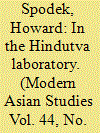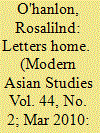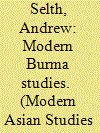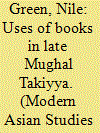|
|
|
Sort Order |
|
|
|
Items / Page
|
|
|
|
|
|
|
| Srl | Item |
| 1 |
ID:
101238


|
|
|
|
|
| Publication |
2010.
|
| Summary/Abstract |
Brajbhasha literature is a domain of Mughal culture seldom investigated by scholars, to the detriment of our understanding of both. While the Mughal court is famed for its lavish support of Persian writers, a surprising number of Brajbhasha poets also attracted the notice of Mughal patrons. In this paper I look at the lives and texts of important Braj writers who worked in Mughal settings, with a view to uncovering the nature of the social, political and cultural interactions that this kind of patronage represents. Why these poets have been largely lost to social and literary history is another concern, along with the challenges of trying to recover their stories.
|
|
|
|
|
|
|
|
|
|
|
|
|
|
|
|
| 2 |
ID:
101240


|
|
|
|
|
| Publication |
2010.
|
| Summary/Abstract |
Communal violence wracked the state of Gujarat and the city of Ahmedabad once again in 2002, leaving some 2,000 people dead. Because the ruling BJP party had proclaimed Gujarat the 'Laboratory of Hindutva', analysts throughout India saw the violence as BJP policy and debated its possible spillover effects elsewhere. This paper finds that in a period already marked by stressful economic and cultural change and attended by political uncertainty, some BJP leaders gambled that an attack on Gujarat's Muslims, and on the rule of law in general, would attract followers and voters. Their gamble proved correct at least in the short run. This paper examines the cultural, social, geographical and educational restructuring that is occurring, through legal and illegal struggles, and the impact of the violence upon these processes. It examines the declining status of Muslims as a result of continuous propaganda against them. It analyzes the degree to which the state was damaged as a result of the decision for violence and asks about the degree to which leaders do, or do not, wish to 'put it behind them', and suggests that Ahmedabad's problems are widely shared in both the developing and developed worlds.
|
|
|
|
|
|
|
|
|
|
|
|
|
|
|
|
| 3 |
ID:
101236


|
|
|
|
|
| Publication |
2010.
|
| Summary/Abstract |
Maratha Brahman families migrated to Banaras in increasing numbers from the early sixteenth century. They dominated the intellectual life of the city and established an important presence at the Mughal and other north Indian courts. They retained close links with Brahmans back in the Maratha regions, where pressures of social change and competition for rural resources led to acrimonious disputes concerning ritual entitlement and precedence in the rural social order. Parties on either side appealed to Banaras for resolution of the disputes, raising serious questions about the nature of Brahman community and identity. Banaras pandit communities struggled to contain these disputes, even as the symbols of their own authority came under attack from the Mughal emperor Aurangzeb. By the early eighteenth century, the emergence of the Maratha state created new models of Brahman authority and community, and new patterns for the resolution of such disputes.
|
|
|
|
|
|
|
|
|
|
|
|
|
|
|
|
| 4 |
ID:
101241


|
|
|
|
|
| Publication |
2010.
|
| Summary/Abstract |
Burma has never been a popular subject for academic research but, since a massive pro-democracy uprising drew worldwide attention to the country in 1988, the number of scholars and students engaged in the field has grown considerably. However, they still face a number of major challenges. Along with other kinds of area studies, Burma studies have been accused by academics from the more 'scientific' disciplines of being too narrowly focused and lacking theoretical rigour. Also, it has been difficult to conduct research in Burma's closed society. While the latest military government has relaxed some controls, field work is still constrained and reliable sources are hard to find. Often, the knowledge gap has been filled by myths and misconceptions. Adding to these problems, since 1988 the Burma studies community has become highly polarised, with political and moral factors often featuring more prominently in the public debate than considered arguments based on objective analysis. All these factors have adversely affected modern Burma studies and restricted understanding of this deeply troubled country by both scholars and the wider community.
|
|
|
|
|
|
|
|
|
|
|
|
|
|
|
|
| 5 |
ID:
101239


|
|
|
|
|
| Publication |
2010.
|
| Summary/Abstract |
This paper explores India's role in the development and design of the United Nations (UN), refracted through the Commission that drafted the Universal Declaration of Human Rights. Through an analysis of sovereignty, citizenship, nationality and human rights from the 1940s to 1956, the paper discusses what India hoped the UN to be, and more generally what they intended for the new world order and for themselves. The paper challenges existing interpretations of international affairs in this period. It seeks to reform our understanding of Jawaharlal Nehru's intellectual vision, and in the process attempts to recast the very concept of post-coloniality.
|
|
|
|
|
|
|
|
|
|
|
|
|
|
|
|
| 6 |
ID:
101237


|
|
|
|
|
| Publication |
2010.
|
| Summary/Abstract |
This paper addresses several questions that appear preliminary to understanding the circulation of knowledge in early modern India (circa 1500 to 1800): What work did writing do? What was the relationship between writing and speaking? And what can our answers to these questions tell us about cultural formulations of 'knowledge' in this period? After addressing these questions on 'modes' of circulation, this paper turns to the more practical issue of 'means' of circulation, looking at the intersection between religious and bureaucratic patterns of the production and consumption of books in the absence of printing in Indian languages. Overall, the paper argues for early modernity as a period of tension and transition between 'anthropocentric' and 'bibliocentric' attitudes towards the location and thence circulation of knowledge in a Persianate context. The issues are exemplified by reference to the various and, at times, perplexing uses of books in an imperial dervish lodge or takiyya.
|
|
|
|
|
|
|
|
|
|
|
|
|
|
|
|
|
|
|
|
|